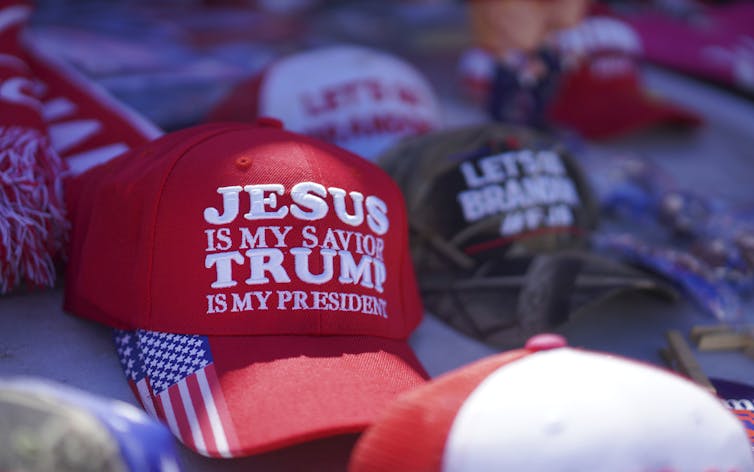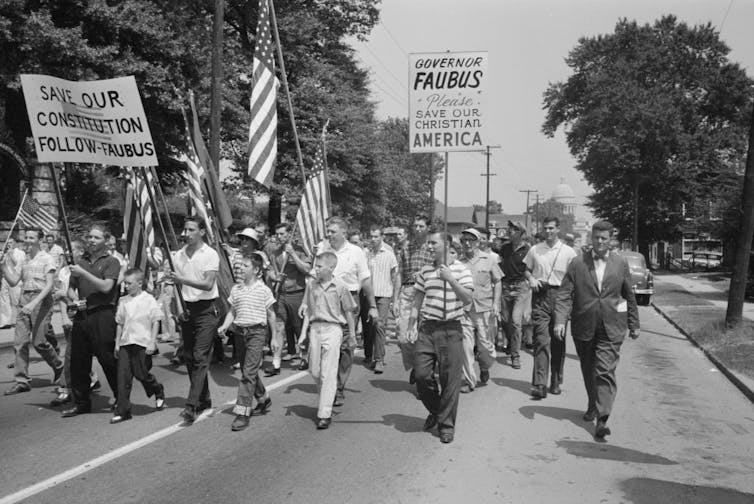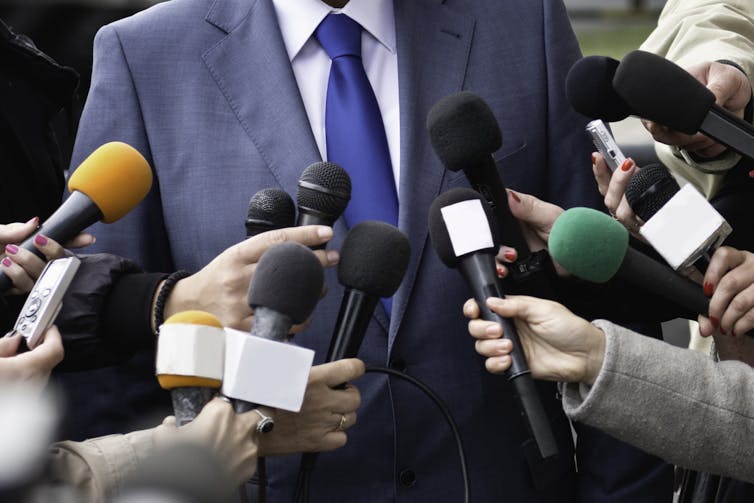President Donald Trump and members of his administration have lengthy used allegations of anti-Christian discrimination as a rallying cry for supporters, arguing that insurance policies and legal guidelines on points like college prayer and LGBTQ+ rights threaten Christians’ proper to precise their beliefs.
Weeks into his second time period, Trump took motion, signing an government order on “Eradicating Anti-Christian Bias.” The order vowed to “defend the non secular freedoms of People and finish the anti-Christian weaponization of presidency” by figuring out anti-Christian conduct and recommending coverage modifications. In mid-April, Secretary of State Marco Rubio instructed staff within the State Division to report any incidents of such bias that occurred in the course of the Biden administration.
Many critics contest claims of widespread discrimination towards Christians in U.S. society, provided that Christians are the nation’s largest religion group and profit from related privileges. Take into account how Christmas is acknowledged as a federal vacation, whereas different faiths’ main holidays should not.
As social psychologists, we had been curious who claims of anti-Christian bias attraction to, and how these claims are perceived.

Our 2024 analysis, in addition to different students’ work, suggests that folks’s beliefs about anti-Christian discrimination are tied with their attitudes about race. These research recommend that when politicians discuss anti-Christian bias, it does greater than sign a priority and dedication to Christians – it may additionally function a sign of white solidarity.
A altering America
Though they continue to be the most important non secular and racial teams, white People and Christian People have each declined as a proportion of the U.S. inhabitants. Over the previous 20 years, the proportion of Christian People has decreased from 78% to 63%, and the proportion of white People has decreased from 69% to 60%. White Christians now account for lower than 50% of the nation.
Many students have argued that, on the root, some white and Christian People really feel threatened by these demographic shifts. Growing secularization and different cultural modifications have added to some white Christians’ sense that their id is beneath assault. In line with FBI information, nevertheless, solely 3% of hate crimes over the previous 5 years focused Christians. Compared, 14% focused Jews, Muslims or Sikhs – teams that make up simply 3% of the inhabitants.
The Public Faith Analysis Institute discovered that 55% of white People imagine discrimination towards white folks is as a lot of an issue as discrimination towards minority teams. In the meantime, 60% of white evangelicals say that Christians within the U.S. face discrimination.
In his government order, Trump echoes these perceptions of menace, portray an image of embattlement for Christians.
The chief order offers examples of expenses introduced towards Christian pro-life protesters and alleges that Democrats failed to reply to assaults on church buildings. The chief order criticizes the Biden administration for insurance policies that it says “pressure Christians to affirm radical transgender ideology towards their religion,” together with for potential foster mother and father.
Testing views
Traditionally, white folks and Christians had been usually handled because the quintessential People – which means race and faith are tightly related in U.S. tradition.
Sixty-two p.c of white American adults establish as Christian, and 61% of American Christians establish as white.

In our 4 experiments, printed in Psychological Science in March 2024, we examined these connections between views of race and faith, specializing in claims about anti-Christian bias.
First, in two on-line experiments of about 3,000 individuals, we randomly assigned white and Black Christians to one among 4 teams. One group didn’t learn something, whereas the opposite three had been every given a quick blurb about discrimination. Every blurb summarized a unique group’s fears that bias towards them was rising: white People, Black People and Christian People.
Afterward, we requested all of the individuals to evaluate how a lot bias they assume these teams truly face. In comparison with white Christians who didn’t learn something, white Christians who learn the blurb about anti-Christian bias perceived better anti-white bias. Black Christians who learn the blurb about anti-Christian bias, nevertheless, didn’t understand better anti-white bias than Black Christians who didn’t learn something.
Thus, it seems that the white Christians mentally linked anti-Christian and anti-white bias.
In our different two experiments, we randomly assigned about 1,000 white and Black Christians to learn an interview excerpt from a fictional native politician who was requested about probably the most urgent challenge of their neighborhood. The politician both voiced concern about anti-Christian bias, anti-white bias, non secular freedom or the financial system.

Afterward, we requested individuals a number of questions concerning the politician, together with whether or not they thought this determine was liberal or conservative, and whether or not they thought this determine can be “involved about bias towards white folks.” Black and white Christian respondents believed the politician who voiced concern about anti-Christian bias was additionally extra more likely to battle for the rights of white folks, relative to the politician who mentioned the financial system.
We additionally requested individuals whether or not they discovered the politician’s interview offensive. Each Black and white Christians considered the message about anti-Christian bias as much less offensive than the message about anti-white bias.
Importantly, these results held no matter whether or not individuals believed the politician was conservative or liberal.
Taken collectively, these findings recommend that expressing concern for anti-Christian bias might be interpreted as signaling allegiance to white folks – with out the social value of being accused of racism. As an alternative, allegations of anti-Christian bias might be offered in a optimistic manner as problems with “non secular freedom,” a core American worth.
Whether or not deliberately or not, plainly rallying round anti-Christian bias can function a “canine whistle” signaling assist for folks involved about modifications in America’s racial make-up, as properly.
Rosemary (Marah) Al-Kire, Postdoctoral Analysis Affiliate, College of Washington; Clara L. Wilkins, Affiliate Professor of Psychology, College of Washington, and Michael Pasek, Assistant Professor of Psychology, College of Illinois Chicago
This text is republished from The Dialog beneath a Inventive Commons license. Learn the unique article.
![]()
SEE ALSO:
Trump Admin Ends Wastewater Settlement For Black Alabama City, Calling It DEI